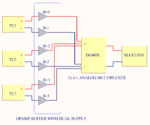udhay_cit
Full Member level 6

- Joined
- May 16, 2008
- Messages
- 346
- Helped
- 37
- Reputation
- 74
- Reaction score
- 37
- Trophy points
- 1,318
- Activity points
- 3,895
I need to interface 3 channels of thermocouple(K- type) with MAX31850 thermocouple signal conditioning IC chip. The output of thermocouple will be in the range of few µV/ °C. Can I use analog multiplexer for my application? Required temperature accuracy is 2°C.



